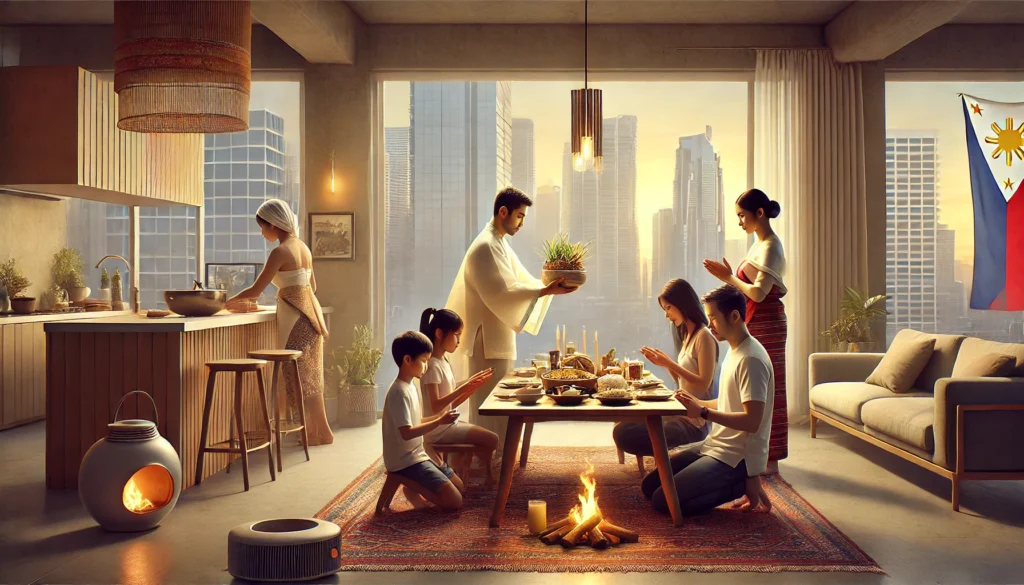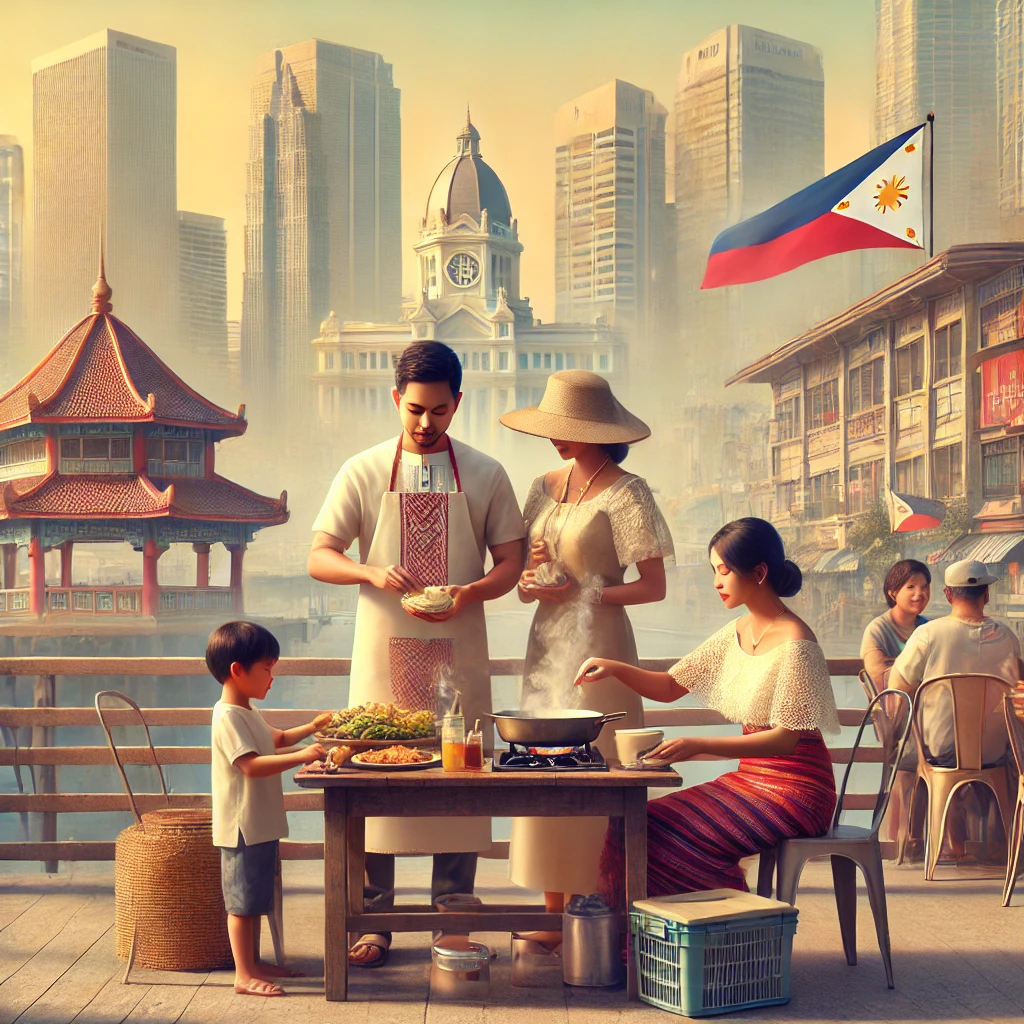The Philippines, an archipelagic nation with a rich cultural heritage, stands at a crossroads between its deeply rooted traditions and the rapid pace of modernization. As the country continues to evolve in the 21st century, Filipino values – the core principles that have long defined the nation’s identity – face both challenges and opportunities. This blog explores the delicate balance between preserving traditional Filipino values and embracing modern influences, examining how this equilibrium shapes the future of Filipino society.
The Foundations of Filipino Values
Historical Context
Filipino values have been shaped by centuries of diverse influences, including indigenous cultures, Spanish colonization, American occupation, and various Asian traditions. This unique blend has resulted in a value system that is both distinctly Filipino and reflective of its complex history. The core Filipino values, known as “kapwa” (shared identity), “utang na loob” (debt of gratitude), “hiya” (propriety), and “pakikisama” (getting along with others), have long been the pillars of Filipino society, guiding social interactions, family dynamics, and community relationships.
These traditional values have served as the bedrock of Filipino culture, fostering a sense of community, respect for elders, and strong family ties. They have contributed to the resilience of Filipino society, helping communities weather challenges and maintain social cohesion. However, as the Philippines continues to modernize and globalize, these values are increasingly coming into contact – and sometimes conflict – with new ideas and ways of life.
Key Traditional Filipino Values
To better understand the foundation of Filipino values, let’s examine some of the most significant ones in detail:
| Value | Description | Significance |
|---|---|---|
| Kapwa | The shared inner self; treating others as fellow human beings | Promotes empathy and social harmony |
| Utang na Loob | Debt of gratitude; reciprocity in relationships | Strengthens social bonds and encourages mutual support |
| Hiya | Sense of propriety; shame or loss of face | Regulates social behavior and maintains group harmony |
| Pakikisama | Getting along with others; conformity to group norms | Fosters smooth interpersonal relationships and group cohesion |
| Bayanihan | Community spirit; mutual assistance | Encourages collective action and community support |
| Respect for Elders | Deference to older family and community members | Preserves traditional knowledge and maintains social hierarchy |
These values have historically played a crucial role in shaping Filipino society, influencing everything from family dynamics to business practices and governance. As we explore the future of Filipino values, it’s essential to consider how these foundational principles interact with modern influences and evolving societal needs.
The Impact of Modernization on Filipino Values
Technological Advancements
The rapid advancement of technology has had a profound impact on Filipino society and its values. The widespread adoption of smartphones, social media, and the internet has transformed the way Filipinos communicate, access information, and perceive the world around them. While these technological changes have brought numerous benefits, such as increased connectivity and access to global knowledge, they have also challenged traditional values in several ways.
For instance, the concept of “kapwa” or shared identity, which traditionally emphasized face-to-face interactions and communal living, is now being redefined in the digital age. Social media platforms have created new forms of community, allowing Filipinos to connect with people across vast distances. However, this digital connectedness can sometimes come at the expense of deeper, more meaningful personal relationships that were once the norm in Filipino society.
Similarly, the value of “utang na loob” or debt of gratitude is being tested in an era where transactional relationships are becoming more common. The ease of digital communications and online transactions can sometimes lead to a weakening of the long-term, reciprocal relationships that this value traditionally encouraged.
Economic Changes
The Philippines has experienced significant economic growth in recent years, with GDP growth rates averaging around 6% annually from 2010 to 2017. This economic progress has brought about changes in lifestyle, career aspirations, and social mobility that have implications for traditional Filipino values.
| Year | GDP Growth Rate (%) |
|---|---|
| 2010 | 7.6 |
| 2011 | 3.7 |
| 2012 | 6.7 |
| 2013 | 7.1 |
| 2014 | 6.1 |
| 2015 | 6.1 |
| 2016 | 6.9 |
| 2017 | 6.7 |
Source: World Bank Data (2017)
The shift towards a more market-driven economy has, in some cases, led to a greater emphasis on individual achievement and material success. This can sometimes conflict with traditional values such as “bayanihan” (community spirit) and “pakikisama” (getting along with others), which prioritize collective well-being over individual gain.
Moreover, increased urbanization and the growth of the service sector have led to changes in family structures and living arrangements. The traditional extended family model, which was a cornerstone of Filipino society, is gradually giving way to nuclear families in urban areas. This shift has implications for values such as respect for elders and familial obligations, as younger generations may have less frequent contact with their extended family members.
Globalization and Cultural Exchange
Globalization has exposed Filipinos to a wide array of cultural influences, leading to a more cosmopolitan outlook, especially among the younger generation. This exposure has brought both opportunities and challenges to traditional Filipino values.
On one hand, globalization has allowed Filipinos to share their culture with the world, fostering a sense of pride in their heritage. Filipino cuisine, music, and art have gained international recognition, reinforcing cultural identity. On the other hand, the influx of foreign cultural products and ideas has led to a degree of cultural hybridization, where traditional Filipino values are being reinterpreted and sometimes diluted in the face of global trends.
The large Filipino diaspora, with over 10 million Overseas Filipino Workers (OFWs) as of 2017, has also played a significant role in this cultural exchange. While OFWs contribute significantly to the Philippine economy through remittances, they also bring back new ideas and practices from their host countries, further influencing the evolution of Filipino values.
Preserving Traditional Values in a Modern Context
Education and Cultural Awareness
One of the key strategies for preserving traditional Filipino values in the face of modernization is through education and cultural awareness programs. The Philippine educational system has made efforts to integrate traditional values into the curriculum, ensuring that younger generations are exposed to and understand the importance of these cultural foundations.
For example, the Department of Education has implemented programs that focus on character education, emphasizing values such as respect, responsibility, and integrity. These programs aim to instill traditional Filipino values within the context of modern society, helping students understand how these principles can be applied in their daily lives and future careers.
Additionally, cultural institutions such as museums, heritage sites, and cultural centers play a crucial role in preserving and promoting traditional Filipino values. By showcasing Filipino history, art, and traditions, these institutions help foster a sense of cultural pride and identity among Filipinos of all ages.
Adapting Traditional Values to Modern Contexts
Rather than viewing traditional values and modernity as opposing forces, many Filipinos are finding ways to adapt and reinterpret their cultural heritage in light of contemporary realities. This process of adaptation allows for the preservation of core values while acknowledging the changing needs of society.
For instance, the concept of “bayanihan” or community spirit, traditionally associated with neighbors helping to physically move a family’s house, is being reimagined in urban settings. Modern expressions of bayanihan can be seen in community clean-up drives, volunteer organizations, and online crowdfunding campaigns for those in need. These activities maintain the spirit of communal support while adapting to the realities of urban life and digital connectivity.
Similarly, the value of respect for elders is being redefined in light of changing family dynamics and increased geographical mobility. While the traditional practice of “mano” (the gesture of pressing an elder’s hand to one’s forehead as a sign of respect) may be less common in some urban settings, respect for elders is being expressed through other means, such as regular video calls with family members or involving older relatives in important decision-making processes.
Leveraging Technology to Reinforce Values
While technology can pose challenges to traditional values, it also offers opportunities for their reinforcement and promotion. Social media platforms, for example, have become powerful tools for celebrating Filipino culture and values.
Filipino netizens often use these platforms to share content that promotes traditional values, such as heartwarming stories of “utang na loob” or examples of modern-day “bayanihan.” This digital sharing not only reinforces these values among Filipinos but also introduces them to a global audience, fostering cultural pride and understanding.
Moreover, technology is being used to preserve and disseminate traditional knowledge. Digital archives of Filipino folklore, language, and cultural practices are being created, ensuring that this information is accessible to future generations. Online language learning platforms are also helping to preserve and promote Filipino languages and dialects, which are intrinsically linked to cultural values.
The Evolving Nature of Filipino Values
Generational Shifts
As with any society, different generations in the Philippines often have varying perspectives on traditional values and their relevance in modern life. Understanding these generational shifts is crucial for predicting the future trajectory of Filipino values.
Baby Boomers and Generation X
Filipinos born between 1946 and 1980, encompassing the Baby Boomer and Generation X cohorts, tend to have a stronger connection to traditional Filipino values. Having grown up in a less globalized Philippines, they often place high importance on family ties, respect for authority, and community-oriented values like “bayanihan” and “pakikisama.”
However, many in these generations have also witnessed significant societal changes and have had to adapt their values accordingly. For instance, the increasing prevalence of overseas work has led to a reinterpretation of family roles and responsibilities, with many maintaining strong family ties despite physical distance through regular communication and remittances.
Millennials and Generation Z
Younger Filipinos, born from the 1980s onwards, have grown up in a more globalized and technologically advanced environment. While they often maintain a strong sense of Filipino identity, their interpretation and application of traditional values can differ significantly from older generations.
For example, while respect for elders remains important, younger Filipinos may be more likely to question authority and traditional hierarchies. They may prioritize individual expression and personal fulfillment alongside family obligations, leading to a more balanced approach to career and family life.
Moreover, millennials and Gen Z Filipinos are often at the forefront of social movements, using traditional values like “bayanihan” to address modern issues such as environmental conservation, social justice, and mental health awareness. This represents an evolution of traditional values to encompass broader societal concerns.
The Role of Social Media in Shaping Values
Social media plays a significant role in shaping the values of younger generations of Filipinos. As of 2017, the Philippines ranked first globally in terms of social media usage, with Filipinos spending an average of 4 hours and 17 minutes per day on social platforms.
| Platform | Percentage of Filipino Internet Users |
|---|---|
| 94% | |
| YouTube | 72% |
| 32% | |
| 29% |
Source: We Are Social Digital Report (2017)
This high level of social media engagement exposes Filipino youth to a wide range of ideas and cultural influences, both local and global. While this can lead to a more diverse and inclusive worldview, it also presents challenges in terms of maintaining cultural identity and traditional values.
Social media has become a platform for dialogue about Filipino values, allowing for intergenerational discussions and debates. It has also become a space for the reimagining of traditional values in modern contexts, with viral content often showcasing modern interpretations of “bayanihan,” “utang na loob,” and other core Filipino values.
Challenges and Opportunities for Filipino Values in the Future
Balancing Tradition and Progress
One of the primary challenges facing Filipino values in the future is striking a balance between preserving tradition and embracing progress. As the Philippines continues to develop economically and technologically, there is a risk that some traditional values may be seen as outdated or incompatible with modern life.
For instance, the value of “hiya” (propriety or shame) can sometimes conflict with the need for assertiveness in a competitive global economy. Similarly, the emphasis on collective harmony in “pakikisama” may sometimes be at odds with the innovation and risk-taking required in entrepreneurship and technological advancement.
However, these challenges also present opportunities for the evolution and reinterpretation of Filipino values. By finding ways to apply traditional principles to modern contexts, Filipinos can create a unique cultural identity that honors their heritage while embracing the future. For example, the principle of “kapwa” or shared identity could be expanded to foster a sense of global citizenship and cross-cultural understanding in an increasingly interconnected world.
Addressing Social Issues Through Values
Traditional Filipino values have the potential to play a crucial role in addressing contemporary social issues. By reframing these values in the context of modern challenges, Filipinos can leverage their cultural strengths to create positive change.
For example, the concept of “bayanihan” could be applied to tackle environmental issues, with communities coming together to implement sustainable practices and conservation efforts. The value of “utang na loob” could be extended beyond personal relationships to foster a sense of civic responsibility and engagement in national development.
Moreover, traditional values could be instrumental in addressing social problems such as inequality and corruption. By emphasizing the importance of “kapwa” and collective well-being, Filipinos can work towards creating a more equitable and just society.
The Impact of Continued Globalization
As the Philippines becomes increasingly integrated into the global economy and culture, Filipino values will continue to face both challenges and opportunities. The ongoing process of globalization is likely to bring further exposure to diverse ideas and lifestyles, potentially leading to further hybridization of Filipino culture.
This cultural exchange can be seen as an opportunity for Filipino values to evolve and adapt, incorporating new ideas while maintaining their core essence. For instance, the Filipino value of hospitality and warmth (“pakikipagkapwa-tao”) could be leveraged in the growing global tourism and service industries, becoming a distinctive feature of the Philippine brand on the world stage.
However, there is also a risk of cultural homogenization, where distinctive Filipino values might be diluted or lost in the face of global trends. To counter this, there may be a need for more deliberate efforts to preserve and promote Filipino cultural heritage, both within the country and in the global Filipino diaspora.
Conclusion
The future of Filipino values lies in the delicate balance between honoring tradition and embracing modernity. As the Philippines continues to evolve in the 21st century, its core values – shaped by centuries of history and cultural influences – will undoubtedly face new challenges and opportunities.
The key to maintaining the relevance and strength of Filipino values lies in their adaptability. By reinterpreting traditional principles in light of contemporary realities, Filipinos can create a value system that is both rooted in their rich cultural heritage and responsive to the demands of a rapidly changing world.
Education, cultural awareness, and technological innovation will play crucial roles in this process of adaptation and preservation. By fostering a deep understanding of Filipino values among younger generations and leveraging modern tools to promote and discuss these principles, the Philippines can ensure that its cultural identity remains strong and vibrant in the face of global influences.
Ultimately, the future of Filipino values will be shaped by the collective choices and actions of the Filipino people. By actively engaging in dialogue about their cultural heritage, critically examining traditional principles in light of modern challenges, and finding innovative ways to apply these values in their daily lives, Filipinos can create a future that honors their past while embracing the opportunities of the present and future.
As the Philippines navigates the complexities of the modern world, its unique value system – with its emphasis on community, respect, reciprocity, and shared identity – has the potential to offer valuable insights and approaches to global challenges. By balancing tradition and modernity, Filipino values can not only continue to shape the nation’s identity but also contribute meaningfully to the broader tapestry of global culture and human understanding.
Disclaimer: This blog post is based on data and information available up to 2017. While every effort has been made to ensure accuracy, societal trends and statistics may have changed since then. Readers are encouraged to consult more recent sources for the most up-to-date information. If you notice any inaccuracies, please report them so we can correct them promptly.




